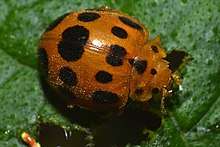Epilachna borealis
Epilachna borealis is a species of beetle that can commonly be found in the eastern United States. It is yellow with seven large black spots on each elytron and four small black spots on the pronotum. The species feeds on cucurbitaceous plants. Its common name is Squash beetle.[1] It is often mistaken for a Ladybug or a Cucumber Beetle because of its similar appearance.
| Epilachna borealis | |
|---|---|
 | |
| Scientific classification | |
| Kingdom: | |
| Phylum: | |
| Class: | |
| Order: | |
| Family: | |
| Genus: | |
| Species: | E. borealis |
| Binomial name | |
| Epilachna borealis (Fabricius, 1775) | |
| Synonyms | |
| |
Biology
The beetle lays a cluster of small yellow eggs on the leaf surfaces of cucurbitaceous plants [2]. Both adult beetles and larvae feed on leaf tissue in between veins[3], and usually start by producing a semi-circle trench around their intended feeding area [4]. Adult squash beetles can also be found feeding on the rind of pumpkins and squash later in the season [5].
gollark: You need to define it before use.
gollark: Ah, different issue then.
gollark: Isn't it great?
gollark: Which means that if SC ever hits 65536 computers one will receive all rednet traffic.
gollark: That's completely different and don't use rednet.
References
- The Common Insects of North America by Lester A. Swan and Charles S. Papp, 1972, page 412
- Boucher, Jude (2014). "Squash Beetle". UConn Extension. Retrieved April 27, 2020.
'Eggs are yellow and stand erect on the leaf surface in a loose cluster with space between each egg.'
- "Squash Beetle - Vegetables". University of Maryland Extension. Retrieved April 27, 2020.
- Boucher, Jude (2014). "Squash Beetle". UConn Extension. Retrieved April 27, 2020.
'Both adults and larvae start feeding by producing a trench around the leaf tissue that they intend to consume.'
- Boucher, Jude (2014). "Squash Beetle". UConn Extension. Retrieved April 27, 2020.
'Late in the season, large numbers of adult beetles may be found feeding on the rind of a single or many adjacent squash and pumpkin fruit.'
This article is issued from Wikipedia. The text is licensed under Creative Commons - Attribution - Sharealike. Additional terms may apply for the media files.